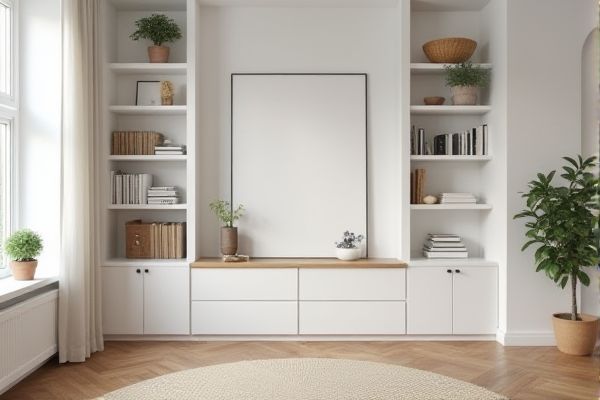
White shelving offers a clean, modern look that brightens up any space and complements a variety of decor styles, while wood finish shelving provides warmth and a natural, timeless aesthetic that adds character and texture to your room. Discover how to choose the perfect shelving option that matches your style and functional needs by reading the rest of this article.
Table of Comparison
| Feature | White Shelving | Wood Finish Shelving |
|---|---|---|
| Appearance | Modern, clean, bright | Warm, natural, rustic |
| Material | Often MDF or painted metal | Solid wood or wood veneer |
| Durability | Resistant to stains, can chip | Durable, may show scratches and dents |
| Maintenance | Easy to clean with mild detergent | Requires occasional polishing or treatment |
| Style Compatibility | Minimalist, contemporary, Scandinavian | Traditional, farmhouse, industrial |
| Cost | Generally lower cost | Typically higher cost |
| Customization | Limited to paint color, finish | Variety of wood types, stains, and finishes |
| Environmental Impact | May use synthetic materials | Biodegradable, sustainable if sourced responsibly |
Introduction to White vs Wood Finish Shelving
White shelving offers a modern, clean aesthetic that brightens spaces and complements minimalist or contemporary interiors. Wood finish shelving introduces warmth and natural texture, enhancing traditional or rustic decor with its rich grain patterns and earthy tones. Choosing between white and wood finish shelving depends on desired ambiance, room lighting, and existing furniture styles.
Aesthetic Appeal: Modern vs Classic Looks
White shelving offers a sleek, modern aesthetic that brightens spaces and creates a clean, minimalist vibe ideal for contemporary interiors. Wood finish shelving provides a warm, timeless appeal with natural textures that complement classic and rustic decor styles. Your choice influences the room's atmosphere, balancing either fresh, airy sophistication or cozy, traditional charm.
Versatility and Design Compatibility
White shelving offers unmatched versatility, blending seamlessly with modern, minimalist, and Scandinavian interiors while brightening spaces and creating a clean, airy feel. Wood finish shelving provides a warm, natural aesthetic that complements rustic, traditional, and industrial designs, adding texture and depth to rooms. Both options enhance design compatibility by allowing easy coordination with various color palettes and decor styles.
Durability and Maintenance Considerations
White shelving often requires more frequent cleaning to maintain its pristine appearance, as it shows dust, dirt, and scratches more easily compared to wood finish shelving. Wood finish shelving typically offers greater durability, with solid wood or wood veneer providing resistance to wear and the ability to conceal minor imperfections over time. Choosing the right option depends on Your desired balance between aesthetic appeal and long-term maintenance effort.
Cost Comparison: White Shelving vs Wood Finish
White shelving generally offers a more budget-friendly option compared to wood finish shelving due to the lower cost of materials like MDF or laminate used in white shelves. Wood finish shelving, especially those made from solid wood or high-quality veneers, tends to be pricier because of the natural materials and craftsmanship involved. When choosing shelving for Your space, balancing cost with durability and aesthetic preferences will help determine the best investment.
Space Enhancement and Light Reflection
White shelving maximizes space enhancement by creating an airy, open feel that visually expands smaller rooms, while wood finish shelving offers a warmer, cozier atmosphere but may absorb light. The high light reflection properties of white surfaces increase brightness and make your room appear more spacious, ideal for areas with limited natural light. Choosing white shelving enhances your interior by boosting light dispersion and spatial perception compared to the more muted, textured effect of wood finishes.
Environmental Impact and Sustainability
White shelving typically involves a painted or laminated finish, which often contains chemicals and plastics that can increase environmental pollution and reduce recyclability. Wood finish shelving, especially when sourced from FSC-certified sustainable forests, offers a renewable and biodegradable option with a lower carbon footprint. Choosing wood finish shelving supports sustainable forestry practices and minimizes landfill waste through better end-of-life biodegradability.
Customization Options and Availability
White shelving offers extensive customization options, including adjustable heights, modular designs, and a variety of sleek finishes that complement modern interiors. Wood finish shelving provides a warm, natural look with customizable stain colors, grain patterns, and sizes to match traditional or rustic decor styles. Both types are widely available in retail stores and online, with wood finishes often offering more artisanal customization through bespoke carpentry services.
Best Uses for White Shelving
White shelving excels in modern and minimalist interiors, providing a clean, bright look that enhances small spaces and maximizes light reflection. It is ideal for displaying colorful items, art pieces, or in home offices where a crisp, organized aesthetic is desired. Your choice of white shelving can create a versatile backdrop that complements various decor styles without overpowering the room.
Best Uses for Wood Finish Shelving
Wood finish shelving is ideal for creating a warm, natural aesthetic in living rooms, libraries, and home offices, where its rich textures complement traditional and rustic decor. Its durability and ability to hide minor scratches make it suitable for heavy storage in garages and workshops. The versatility of wood finishes allows seamless integration with various color schemes, enhancing both functionality and visual appeal in residential and commercial settings.
 homyna.com
homyna.com